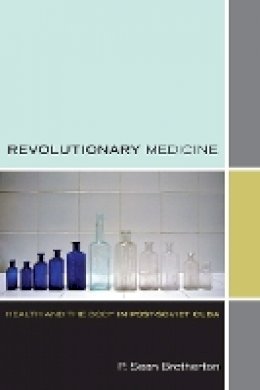11%OFF

Stock image for illustration purposes only - book cover, edition or condition may vary.
Revolutionary Medicine: Health and the Body in Post-Soviet Cuba
P. Sean Brotherton
€ 37.99
€ 33.87
FREE Delivery in Ireland
Description for Revolutionary Medicine: Health and the Body in Post-Soviet Cuba
Paperback. An ethnography of post-Soviet Cuba s health-care sector which reveals Cuba to be a pragmatic and contradictory state. Series: Experimental Futures. Num Pages: 288 pages, 29 illustrations, 3 tables, 2 figures. BIC Classification: 1KLCM; JFC; JHMP; MBNH. Category: (P) Professional & Vocational. Dimension: 226 x 150 x 18. Weight in Grams: 382.
Revolutionary Medicine is a richly textured examination of the ways that Cuba's public health care system has changed during the past two decades and of the meaning of those changes for ordinary Cubans. Until the Soviet bloc collapsed in 1989, socialist Cuba encouraged citizens to view access to health care as a human right and the state's responsibility to provide it as a moral imperative. Since the loss of Soviet subsidies and the tightening of the U.S. economic embargo, Cuba's government has found it hard to provide the high-quality universal medical care that was so central to the revolutionary socialist ... Read more
Revolutionary Medicine is a richly textured examination of the ways that Cuba's public health care system has changed during the past two decades and of the meaning of those changes for ordinary Cubans. Until the Soviet bloc collapsed in 1989, socialist Cuba encouraged citizens to view access to health care as a human right and the state's responsibility to provide it as a moral imperative. Since the loss of Soviet subsidies and the tightening of the U.S. economic embargo, Cuba's government has found it hard to provide the high-quality universal medical care that was so central to the revolutionary socialist ... Read more
Product Details
Format
Paperback
Publication date
2012
Publisher
Duke University Press United States
Number of pages
296
Condition
New
Series
Experimental Futures
Number of Pages
288
Place of Publication
North Carolina, United States
ISBN
9780822352051
SKU
V9780822352051
Shipping Time
Usually ships in 7 to 11 working days
Ref
99-1
About P. Sean Brotherton
P. Sean Brotherton is Assistant Professor of Anthropology at Yale University.
Reviews for Revolutionary Medicine: Health and the Body in Post-Soviet Cuba
"Revolutionary Medicine is fabulous. In this intelligent, insightful, and nuanced book, P. Sean Brotherton takes health care as a window through which to view and understand the 'new Cuba,' which, as he notes, incorporates elements of the prerevolutionary period, the Soviet era, and the post-Soviet era. Both substantively and analytically, this is a book of very high quality."—Susan Eckstein, author ... Read more
